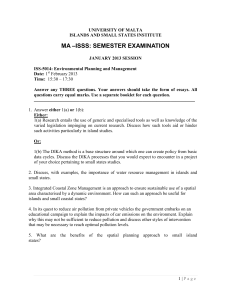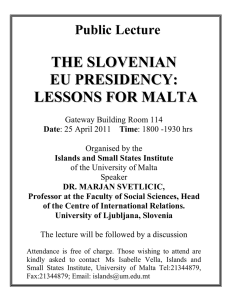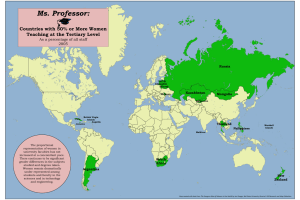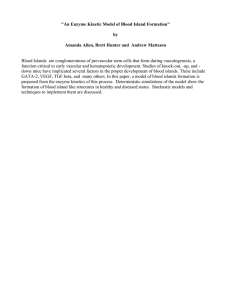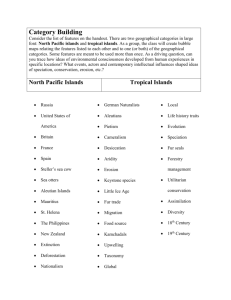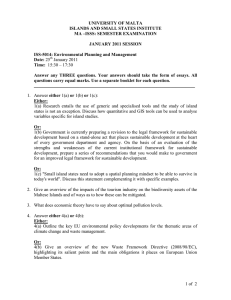Declaration of Vice-President Vukas - International Tribunal for the
advertisement
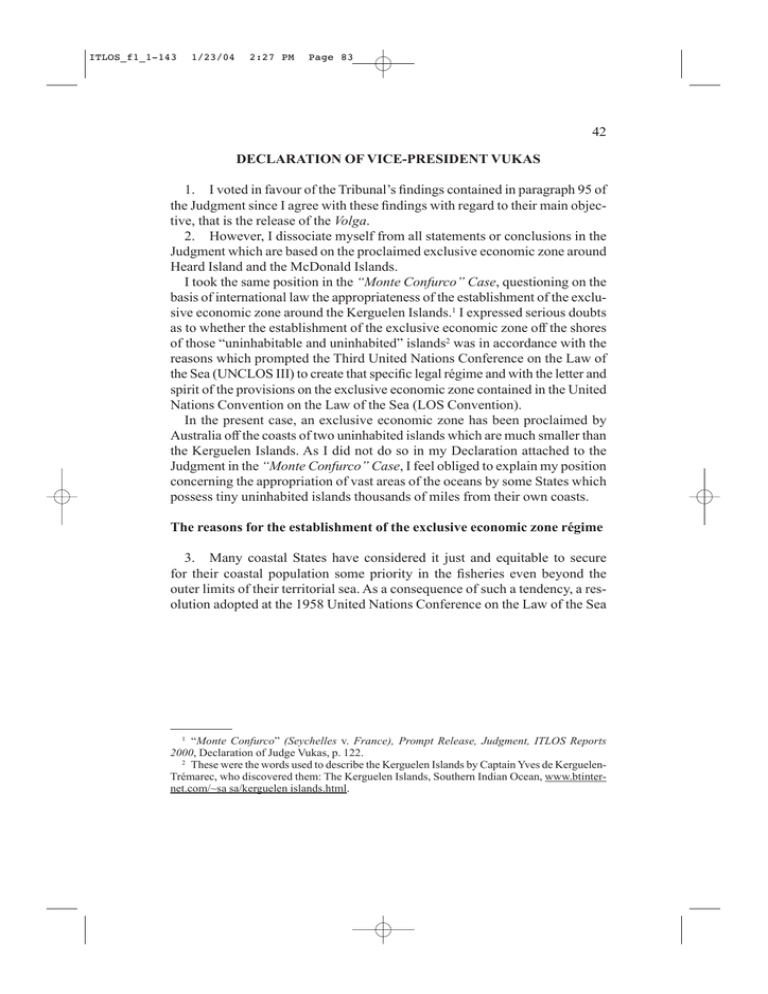
ITLOS_f1_1-143 1/23/04 2:27 PM Page 83 42 DECLARATION OF VICE-PRESIDENT VUKAS 1. I voted in favour of the Tribunal’s findings contained in paragraph 95 of the Judgment since I agree with these findings with regard to their main objective, that is the release of the Volga. 2. However, I dissociate myself from all statements or conclusions in the Judgment which are based on the proclaimed exclusive economic zone around Heard Island and the McDonald Islands. I took the same position in the “Monte Confurco” Case, questioning on the basis of international law the appropriateness of the establishment of the exclusive economic zone around the Kerguelen Islands.1 I expressed serious doubts as to whether the establishment of the exclusive economic zone off the shores of those “uninhabitable and uninhabited” islands2 was in accordance with the reasons which prompted the Third United Nations Conference on the Law of the Sea (UNCLOS III) to create that specific legal régime and with the letter and spirit of the provisions on the exclusive economic zone contained in the United Nations Convention on the Law of the Sea (LOS Convention). In the present case, an exclusive economic zone has been proclaimed by Australia off the coasts of two uninhabited islands which are much smaller than the Kerguelen Islands. As I did not do so in my Declaration attached to the Judgment in the “Monte Confurco” Case, I feel obliged to explain my position concerning the appropriation of vast areas of the oceans by some States which possess tiny uninhabited islands thousands of miles from their own coasts. The reasons for the establishment of the exclusive economic zone régime 3. Many coastal States have considered it just and equitable to secure for their coastal population some priority in the fisheries even beyond the outer limits of their territorial sea. As a consequence of such a tendency, a resolution adopted at the 1958 United Nations Conference on the Law of the Sea 1 “Monte Confurco” (Seychelles v. France), Prompt Release, Judgment, ITLOS Reports 2000, Declaration of Judge Vukas, p. 122. 2 These were the words used to describe the Kerguelen Islands by Captain Yves de KerguelenTrémarec, who discovered them: The Kerguelen Islands, Southern Indian Ocean, www.btinternet.com/~sa sa/kerguelen islands.html. ITLOS_f1_1-143 1/23/04 2:27 PM Page 85 “VOLGA” (DECL. VUKAS) 43 considered the special situation of countries whose coastal population depended “upon coastal fisheries for their livelihood or economic development in an area of the high seas adjacent to the territorial sea of the coastal State . . .”.3 At the Second United Nations Conference on the Law of the Sea (Geneva, 1960) a proposal claiming preferential rights for the fisheries of the coastal State in the high seas adjacent to its waters if “the exploitation of the living resources of the high seas in that area [was] of fundamental importance to the economic development of the coastal State or the feeding of its population” was widely supported.4 4. “[T]he concept of preferential rights of fishing in adjacent waters in favour of the coastal State in a situation of special dependence on its coastal fisheries” was in 1974 confirmed by the International Court of Justice as being a concept crystallized as customary international law.5 5. The insistence of developing coastal States that the preferential fishing rights of their population be recognized in an area beyond their territorial waters – already confirmed by the domestic legislation of some of those States – resulted at UNCLOS III in the adoption of the régime of the exclusive economic zone. The scope of the creation of this new international régime at sea is clearly stated by René-Jean Dupuy: The notion of an economic zone, in the view of the developing coastal States, has the purpose of helping them gain access to the resources they previously could not claim; it therefore has unquestionable merit from the standpoint of promoting their interests.6 Thus, the protection of the economic interests of the coastal States, and in particular of their population in the coastal areas, has been the essential factor in establishing this new régime at sea. This is clear not only from the name of the new legal régime itself, but also from the main provisions on the 3 Resolution VI, “Special situations relating to coastal fisheries”, First United Nations Conference on the Law of the Sea, Official Records, Vol. II (Doc. A/CONF.13/38), p. 144. 4 Doc. A/CONF.19/L.12, “Brazil, Cuba, and Uruguay: amendments to the second proposal in document A/CONF.19/L.4”, Second United Nations Conference on the Law of the Sea, Official Records, Vol. I (Doc. A/CONF.19/8), p. 173. 5 Fisheries Jurisdiction (United Kingdom v. Iceland), Merits, Judgment, I.C.J. Reports 1974, p. 23. 6 René-Jean Dupuy, “The Sea under National Competence”, René-Jean Dupuy and Daniel Vignes (eds), A Handbook on the New Law of the Sea, 1, Martinus Nijhoff Publishers, Dordrecht/ Boston/Lancaster, 1991, p. 281. ITLOS_f1_1-143 1/23/04 2:27 PM Page 87 “VOLGA” (DECL. VUKAS) 44 exclusive economic zone in the LOS Convention. The basic rule (article 56, paragraph 1(a)) proclaims the sovereign rights of coastal States “for the purpose of exploring and exploiting, conserving and managing the natural resources, whether living or non-living”. The conservation and management measures undertaken for the maintenance of the living resources in the zone have to take into account, inter alia, “the economic needs of coastal fishing communities” (article 61, paragraph 3). The characteristics of Heard Island and the McDonald Islands 6. All these economic interests and concerns do not exist in respect of uninhabited islands such as Heard Island and the McDonald Islands. There can be no “coastal fishing communities”, as “[t]here is no permanent habitation”.7 According to the same source (UNEP – Protected Areas Programme), “Heard Island is visited infrequently, and the McDonald Islands very rarely.” According to Encyclopaedia Britannica “[m]uch of its [Heard Island’s] surface is covered with snow and ice . . . The McDonalds are a group of uninhabited rocky islets 25 miles (40 km) west of Heard Island”.8 Taking into account all these data, one should not ignore article 121, paragraph 3, of the LOS Convention, where we find many of the elements obviously present in this group of Australian islands/isles/islets/rocks: “Rocks which cannot sustain human habitation or economic life of their own shall have no exclusive economic zone or continental shelf.” Although the terminology used in article 121, paragraph 3, is vague, and the relationships between the components of this rule are rather unclear, taking into account the legislative history of this provision, we must agree with the conclusions arrived at by Barbara Kwiatkowska and Alfred H. A. Soons: As the term “rocks” should be construed as not implying any specific geological features, the essential element of the definition is the second one . . ., namely that it covers only rocks (islands) “which cannot sustain human habitation or economic life of their own”.9 7 Protected Areas Programme, World Heritage Sites, Commonwealth of Australia, Heard Island and McDonald Islands (HIMI), <http://www.wcmc.org.uk/protected_areas/data/sample/0399w.htm>. 8 “Heard and McDonald Islands” Encyclopaedia Britannica <http://search.eb.com/eb/article?eu=40541>. 9 Barbara Kwiatkowska and Alfred H. A. Soons, “Entitlement to Maritime Areas of Rocks Which Cannot Sustain Human Habitation or Economic Life of Their Own”, XXI, Netherlands Yearbook of International Law, 1990, p. 153. ITLOS_f1_1-143 1/23/04 2:27 PM Page 89 “VOLGA” (DECL. VUKAS) 45 The exclusive economic zone and the preservation of marine resources in the Southern Ocean 7. In view of the above-mentioned absence of permanent habitation and the geographical and climatic characteristics of Heard Island and the McDonald Islands, it comes as no surprise that some interests and/or concerns other than economic ones are pointed to as the reason for establishing the exclusive economic zone around these islands. Thus, Dr David Bennett, Solicitor-General of the Respondent, said that the establishment of the exclusive economic zone was useful for the more effective preservation of the marine resources in the rather shallow waters surrounding these islands.10 Notwithstanding the importance of preservation of marine resources, the argument advanced by Dr Bennett does not sound very convincing, particularly in relation to the sea area in question. 8. There are two sets of international treaty rules generally applicable to the conservation of the living resources of the high seas: the 1958 Convention on Fishing and Conservation of the Living Resources of the High Seas, and Part VII, section 2, of the LOS Convention, entitled “Conservation and Management of the Living Resources of the High Seas”. Both Conventions call for cooperation between States whose nationals exploit the same marine areas. One of the best examples of such cooperation is the conclusion of the Convention on the Conservation of Antarctic Marine Living Resources (CCAMLR – Canberra, 20 May 1980). The Commission for the Conservation of Antarctic Marine Living Resources established under the Convention (article VII) has been entrusted with the adoption of conservation measures and the establishment and implementation of a system of observation and inspection (article IX, paragraph 1(f) and (g)). This system includes, inter alia, procedures for boarding and inspection by observers and inspectors designated by the Members of the Commission and procedures for flag state prosecution and sanctions on the basis of evidence resulting from such boarding and inspections . . . (article XXIV, paragraph 2(a)). It is therefore unnecessary and confusing if individual States adopt and apply their own measures in the exclusive economic zone they have proclaimed 10 ITLOS/PV.02/02, p. 24. ITLOS_f1_1-143 1/23/04 2:27 PM Page 91 “VOLGA” (DECL. VUKAS) 46 inside the area of application of the CCAMLR. In this sense, referring to the French exclusive economic zone, Bruce W. Davis remarked that “consistency has had to give way to the requirements for internal acceptance”.11 9. The Report of the Meeting of the Standing Committee on Observation and Inspection (SCOI) of the Commission for the Conservation of Antarctic Marine Living Resources held from 21 to 24 October 2002 provides information about an Australian proposal based on the existence of its exclusive economic zone in the CCAMLR area.12 Australia proposed that article 73, paragraph 2, of the LOS Convention be modified to allow the coastal States to “set a bond for the release of an apprehended vessel at a level that was sufficient to deter further illegal fishing”, instead of determining a “reasonable bond”. This modification would apply primarily in the case of fishing vessels that are arrested by the authorities of CCAMLR Member States that exercise jurisdiction and control over maritime areas that are located within the CCAMLR Convention area. While one might have some sympathy for the Australian proposal as it did not concern the crew (“the requirement for a detaining State to promptly release detained crew would continue to apply”), what is unforgivable is the “specific” interpretation of the text of the LOS Convention: Australia said that in its view Article 311(3) of UNCLOS allows that two or more States may conclude agreements modifying or suspending the operation of provisions of UNCLOS. It comes as no surprise that the Australian proposal, including the interpretation of article 311, paragraph 3, of the LOS Convention, was not supported by other members of the Commission. Three States (Chile, the United Kingdom and New Zealand) politely indicated that the Australian proposal “went beyond the mandate of SCOI” and that it should be discussed directly by the Commission. The Committee endorsed this view. 11 Bruce W. Davis, “The legitimacy of CCAMLR”, Olav Schram Stokke and Davor Vidas (eds), Governing the Antarctic, Cambridge University Press, 1996, p. 244. 12 Doc. CCAMLR – XXI/26, 27 October 2002 (pp. 21–22, paras. 5.100–5.106), contained in the Respondent’s list of authorities (as document No. 3) submitted to the Tribunal on 11 December 2002. ITLOS_f1_1-143 1/23/04 2:27 PM Page 93 “VOLGA” (DECL. VUKAS) 47 Final remark 10. The purpose of this brief text is to explain my belief that the establishment of exclusive economic zones around rocks and other small islands serves no useful purpose and that it is contrary to international law. It is interesting to note that Ambassador Arvid Pardo – the main architect of the contemporary law of the sea – warned the international community of the danger of such a development back in 1971. In the United Nations Seabed Committee he stated: If a 200 mile limit of jurisdiction could be founded on the possession of uninhabited, remote or very small islands, the effectiveness of international administration of ocean space beyond national jurisdiction would be gravely impaired.13 The annexed map showing Australia’s exclusive economic zone around Heard Island and the McDonald Islands, provided by the Agent of the Respondent, confirms that Ambassador Pardo’s fear has been borne out. (Signed) Budislav Vukas 13 UN Sea-Bed Committee, Doc. A/AC.138/SR.57, p. 167. ITLOS_f1_1-143 1/23/04 2:27 PM Page 95 “VOLGA” (DECL. VUKAS) 48
